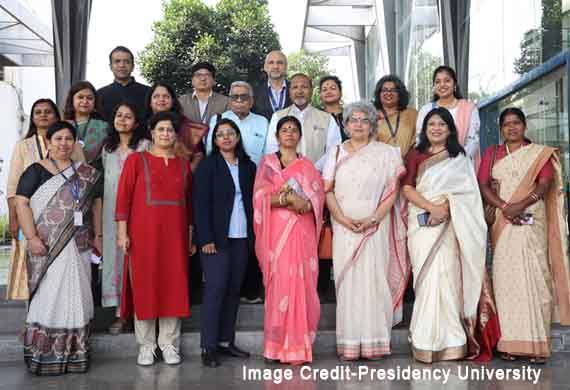
National Conference on Gender & Inclusion Spotlights Women in the Workforce
By: WE Staff | Monday, 25 March 2024
The vibrant city of Bengaluru held an event on gender and inclusion. Presidency University, Center for Development Policy and Practice and GOONJ partnered to organize the National Conference on Gender and Inclusion.
The conference provided a significant platform for discussing gender dynamics in India’s corporate workforce. It incited thought-provoking discussions through presentations under the banner “Women in the Workforce” by respected speakers. They aim at dissecting impediments, possibilities and trends towards equality between sexes as well as including women in commerce.
The opening ceremony began with a powerful speech delivered by the Chief Guest, Vinita Bali. A successful businesswoman herself being an ex-CEO of a multinational company, she shared some experiences from her own corporate journey. Her words set stage for dialogues. Hearty feelings poured down from Dr Gayathri Vasudevan’s passionate address which she made as Sambhav Foundation’s Chief Impact Officer & Chairperson of LabourNet. She chose eight anecdotes regarding gender perception and bias in opinion. Her understanding on social impact and labor added value to any discussion about gender issues.
Ms. Rukmini S., an author and data journalist, who was the keynote speaker at the event chose the topic, “What the Data says: on Gender and the Workforce”. She gave a speech that provided amazing insights into empirical trends relating to the theme.
Presidency University’s Registrar, Dr Sameena Noor Ahmed Panali in her address underscored the importance of women’s involvement in work. It was mentioned as a driving factor for social justice as well as economic prosperity. Dr. Panali emphasized that gender inclusivity has been one of Presidency University’s major goals so far. As such, it has enabled women to take up leadership positions in diverse academic fields over time. The views put across by Dr Anubha Singh are similar to those expressed by Dr Panali. This means that there must be a shift at workplaces if there can be still genuine gender equality in them. According to her, this inclusive environment helps in advancing women academically, researching and leading them through life. The heart of this conference was its panel discussions where experts from various backgrounds came together to analyze questions regarding women’s participation in employment.
The first panel looked into statistics and factors affecting female labor force participation rates; for example, what explains differences between some countries where women constitute 40% of working population and others where they are around 70%? This session was moderated by Dr Shariff under the title Women in the Workforce: What the Data Says.” It analyzed statistical patterns and their root causes impact.
The second panel looked at ways to foster inclusivity amidst challenges. Ms. Marwaha chaired "Woman in the Workforce: Tackling Challenges and Way Forward." It examined legislative frameworks and practical strategies to promote inclusivity despite multifaceted obstacles.
The final panel spotlighted grassroots perspectives and personal experiences overcoming barriers hindering women's entry into the workforce. "Women in the Workforce: Learnings from the Grassroots" was moderated by Mr. Gupta, Founder of GOONJ. He shared individual experiences and insights from the ground level.
Paper presentations enriched the academic talk after the panels. These let scholars and researchers share findings on women in the Indian workforce.
In her valedictory talk, Meenakshi Gupta, Co-Founder of GOONJ, captured key insights. She urged attendees to innovate for gender equality and inclusion.
The Presidency University conference was vital. In Bengaluru, it enabled dialogue, teaming up, and actionable insights on gender and inclusion. By pooling expertise, it aimed to build a future where women not just participate but thrive in the workforce.






